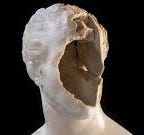Every Tadema painting is like a portal, it embraces you. You are right there, along the imaginary figures from an ancient world. Sometimes merely an observer, other times a part of the scene.
He depicts everyday scenes with all the beauty one can fathom. In his paintings we see sceneries that are deeply human and therefore timeless. It is easy to melt into these paintings because each one of us has lived or seen a scene as is depicted. These are not the kind of paintings that deeply move you, make you feel things you have not ever felt before. These paintings resemble more a museum visit brought alive, a daydream of times long gone.
And yet, the extraordinary beauty in most paintings, almost too much of it, creates a certain distance as rarely do we witness such beauty, destined only for the gods and most rare imaginations.
Each piece of art is composed of art pieces itself. Be it the flower arrangements, be it the gardens, the paintings on the walls, the extraordinary clothing, the chambers, the palaces, the furniture or everyday objects, the antique sculptures and frescos, the jewellery, the flower petals, the turquoise sea. With the exception of few portraits there is no main subject in his paintings, it really is the scene itself that is the subject of the painting. Hence beauty stretches to the very corners of the painting, letting your eyes wander to take it all in. No detail too small, no beauty too exquisite.
Although the sceneries depicted are born in his imagination, when it comes to the depiction of items within the scenery, Tadema was very committed a certain realness and an alleged perfectionist. He used museum displays, historic drawings, even imported real flowers from Africa.
Tadema has an incredibly unique style. He achieved what most proclaimed painters can only dream of, an unmistakable recognition of his paintings.
